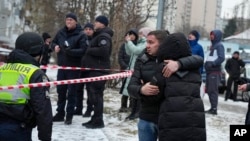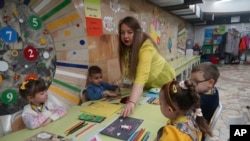When Irynka Hromotska crossed the border from Poland to Ukraine last month, the photojournalist felt a burden of guilt lift.
At the time of Russia's February 2022 invasion, Hromotska, who is Ukrainian, was in the U.S. pursuing a master's degree in photojournalism as a Fulbright student at the Missouri School of Journalism.
Being so far from home and family weighed heavily. But, Hromotska says, her recent return to Lviv to work in media has helped.
“I do not feel guilt anymore,” she told VOA. “I felt so much guilt all the time that I forgot how it feels without it.”
Hromotska is among several journalists who are choosing to move permanently to Ukraine to work for local media.
Many work for The Kyiv Independent, the English-language news site that has made a name for itself among domestic and international audiences in the past two years. Its staff are united by a shared sense of duty to contribute to a Ukrainian victory in the best way they know how.
Among them is Masha Lavrova. A former preschool teacher in Australia, Lavrova returned to her hometown of Kyiv and now works as a TikTok producer and podcast host at The Kyiv Independent.
“I feel like I’m doing my part for the victory and for the fight,” Lavrova said.
But even foreign nationals are driven to work in Ukraine full time. American journalist Lili Bivings told VOA she had decided to build her life and career in Ukraine long before the 2022 full-scale invasion.
Bivings fell in love with the country during her Peace Corps service in Ukraine and says she didn’t think twice when offered a permanent role as The Kyiv Independent’s business editor in the country’s capital.
“Ukraine has done so much for me and given me so much in life. And I love it so much. And when something or someone you love is going through something difficult, you’re not supposed to turn your back,” she said. “It felt like it was just an obvious decision for me to return and continue living here.”
But the work isn’t without its difficulties. Moving to a country at war means getting used to air raids, which though sporadic eventually become part of normal life, said Bivings.
“The first time, it’s really scary. And the second time, you’re a little less scared. And then by the third time, you might not even get out of bed, depending on where you live,” Bivings told VOA. “That’s a strange thing to realize about yourself — that you can get to a point where you’re just brushing them off.”
There’s also pushback from some who don’t want anything bad said during the war, like stories on corruption or the slow counteroffensive against Russia, according to Bivings.
For some journalists, the motivation to work permanently in Ukraine comes from a sense that too few people with personal connections to the country were covering it.
“I found it really disturbing how many people in the media who weren’t personally affected by the war were treating it as sort of a career opportunity,” said Anna Belokur, social media manager for The Kyiv Independent.
An American with Ukrainian heritage, Belokur moved to Kyiv in August from Prague, where she worked at VOA’s sister outlet, Radio Free Europe/Radio Liberty.
“I felt like it would be hypocritical of me to live the rest of my life and have the rest of my career built around this really horrible event if I had just spent the whole time analyzing it from a distance,” she said.
That speaks to a divide between foreign correspondents who are in Ukraine only to cover the war and those there to cover Ukraine in its entirety, Bivings added.
“The people that have settled here and are more in it for the long haul sometimes do look at the journalists who are here just because there’s a war — and it’s popular — they look at them with a little bit of suspicion, like they’re riding a wave,” she said.
And while the war makes up a large part of coverage, regular news coverage of Ukraine beyond the war is also important. Outlets like The Kyiv Independent maintain that balance, staffers said.
Dominic Culverwell, a business reporter at the site, is focusing on reconstruction.
“Every business I've met in Ukraine, and every company, every businessperson, they've all been so resilient, and so determined to not just collapse,” Culverwell said. A British national, Culverwell moved to Kyiv from Berlin in May.
Still, that distinction between domestic and international media isn’t all bad, because the more media attention Ukrainian gets, the better, analysts say.
“We cannot win this war alone,” said Liubov Tsybulska, a specialist in hybrid warfare. “And if we want to have this support, we have to tell our story.”
In a conflict that is taking place as much online as it is on the battlefield, it’s hard to overstate the importance of the role accurate coverage plays in that fight, she said.
A former Ukrainian government and military adviser, Tsybulska founded the Centre for Strategic Communications and Information Security, which operates under Ukraine’s Ministry of Culture.
“In war, there’s so many disinformation sources, and when people are fearful, they tend to believe disinformation,” Tsybulska told VOA from Kyiv. “That’s why journalism plays such a significant role.”
As the second anniversary of Russia’s full-scale invasion looms, the dedication from the journalists remains steadfast.
“There’s a lot of sadness and happiness and struggle,” Culverwell said. “There’s an excitement about what the future is going to be.”






